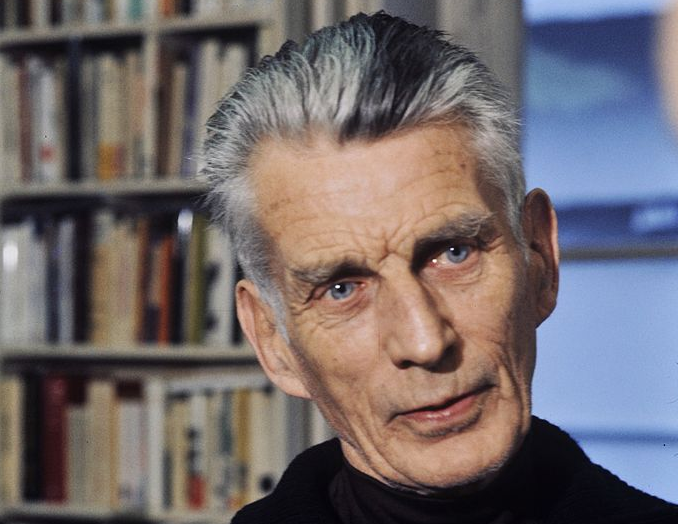Samuel Beckett, Pic, 1″ by Roger Pic. Via Wikimedia Commons
Clad in a black turtleneck and with a shock of white hair, Samuel Beckett was a gaunt, gloomy high priest of modernism. After the 1955 premiere of Samuel Beckett’s play Waiting for Godot (watch him stage a performance here), Kenneth Tynan quipped, ”It has no plot, no climax, no denouement; no beginning, no middle and no end.” From there, Beckett’s work only got more austere, bleak and despairing. His 1969 play Breath, for instance, runs just a minute long and features just the sound of breathing.
An intensely private man, he managed to mesmerize the public even as he turned away from the limelight. When he won the Nobel Prize in 1969, his wife Suzanne, fearing the onslaught of fame that the award would bring, decried it as a “catastrophe.”
A recently published collection of his letters from 1941–1956, the period leading up to his international success with his play Waiting for Godot, casts some light on at least one corner of the man’s private life – what books were piling up on his bed stand. Below is an annotated list of what he was reading during that time. Not surprisingly, he really dug Albert Camus’s The Stranger. “Try and read it,” he writes. “I think it is important.” He dismisses Agatha Christie’s Crooked House as “very tired Christie” but praises Around the World in 80 Days, “It is lively stuff.” But the book he reserves the most praise for is J.D. Salinger’s Catcher in the Rye. “I liked it very much indeed, more than anything for a long time.”
You can see the full list below. It was originally published online by Cambridge University Press in 2011. Books with an asterisk next to the title can be found in our collection of 700 Free eBooks.
Andromaque* by Jean Racine: “I read Andromaque again with greater admiration than ever and I think more understanding, at least more understanding of the chances of the theatre today.”
Around the World in 80 Days* by Jules Verne: “It is lively stuff.”
The Castle by Franz Kafka: “I felt at home, too much so – perhaps that is what stopped me from reading on. Case closed there and then.”
The Catcher in the Rye by J.D. Salinger: “I liked it very much indeed, more than anything for a long time.”
Crooked House by Agatha Christie: “very tired Christie”
Effi Briest* by Theodor Fontane: “I read it for the fourth time the other day with the same old tears in the same old places.”
The Hunchback of Notre Dame* by Victor Hugo
Journey to the End of the Night by Louis-Ferdinand Céline
Lautreamont and Sade by Maurice Blanchot: “Some excellent ideas, or rather starting-points for ideas, and a fair bit of verbiage, to be read quickly, not as a translator does. What emerges from it though is a truly gigantic Sade, jealous of Satan and of his eternal torments, and confronting nature more than with humankind.”
Man’s Fate by Andre Malraux
Mosquitoes by William Faulkner: “with a preface by Queneau that would make an ostrich puke”
The Stranger by Albert Camus: “Try and read it, I think it is important.”
The Temptation to Exist by Emil Cioran: “Great stuff here and there. Must reread his first.”
La 628-E8* by Octave Mirbeau: “Damned good piece of work.”
via Cambridge University Press
Related Content:
Samuel Beckett Directs His Absurdist Play Waiting for Godot (1985)
Monsterpiece Theater Presents Waiting for Elmo, Calls BS on Samuel Beckett
Rare Audio: Samuel Beckett Reads Two Poems From His Novel Watt
Jonathan Crow is a Los Angeles-based writer and filmmaker whose work has appeared in Yahoo!, The Hollywood Reporter, and other publications. You can follow him at @jonccrow. And check out his blog Veeptopus, featuring lots of pictures of badgers and even more pictures of vice presidents with octopuses on their heads. The Veeptopus store is here.



“La 628-E8,” right? “La” isn’t an article to be translated, but rather part of a license plate central to the book? Probably just a typo?
I know that Beckett also really liked Robert Pinget.
I wouldn’t trust a word SB said…or maybe I might…
blanchot!
According to his authorized biographer in his final days Beckett was reading Vonnegut’s “Slaughterhouse Five” and found it “fascinating.” I recall once as an undergraduate pointing out to my professor, who was a well-known Beckett scholar, some parallels between Beckett and Vonnegut. The professor rolled his eyes and said something like “Beckett would not be much interested in an American science fiction writer.” His snobbery was not shared by his meal-ticket author.
Did Samuel Beckett read and recommend poets?
I can relate to this. My professors (in a team-taught class at a top-tier college) pooh-poohed me when I pointed out during “class discussion” instances of Nietzsche being sarcastic and irreverent. My enthusiasm (and trust in the profs’ understanding of their subject matter [meal ticket!]) was dashed.
I later came upon a set of old Philosophy encyclopedias, in which the section on Nietzsche included commentary about how he was often sarcastic. My perceptions were vindicated.
No matching prompts found for the selected category.